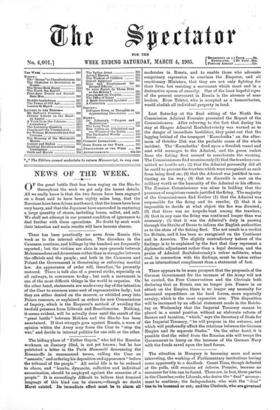Last Saturday at the final sitting of the North Sea
Commission Admiral Fournier presented the Report of the Commissioners. After referring to the fact that during his stay at Skagen Admiral Rozhdestvensky was warned as to the danger of immediate hostilities, they point out that the lagging behind of the transport 'Kamchatka' on the after- noon of October 21st was the probable cause of the whole incident. The ` Kamchatka ' fired upon a Swedish vessel and sent wild messages to the Admiral, and the green rocket from the fishing fleet seemed to corroborate the warning. The Commissioners find unanimously (1) that the trawlers com- mitted no hostile act; (2) that the Admiral personally did all be could to prevent the trawlers which were recognised as such from being fired on; (3) that the Admiral was justified in con- tinuing on his way; (4) that no discredit is cast on the military worth or the humanity of the Admiral or his officers. The Russian Commissioner was alone in holding that the presence of suspicious vessels justified the firing. The majority of the Commissioners find further (1) that the Admiral was responsible for the firing and its results; (2) that it is impossible to decide at what object the fire was directed ; (3) that there was no torpedo-boat among the trawlers ;
(4) that in any case the firing was continued longer than was necessary; (5) that it was the Admiral's duty in passing through the Straits of Dover to inform the English authorities as to the state of the fishing fleet. The net result is a verdict for Britain, and it has been so recognised on the Continent and in America The slightly contradictory nature of the findings is to be explained by the fact that they represent a diplomatic adjustment rather than a legal decision, and the praise of Admiral Rozhdestvensky's =tear militaire, when read in connection with the findings, must be taken rather as an international compliment than a statement of fact.










































